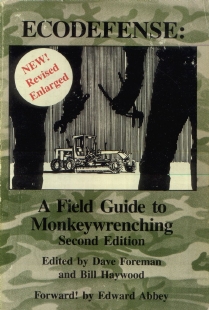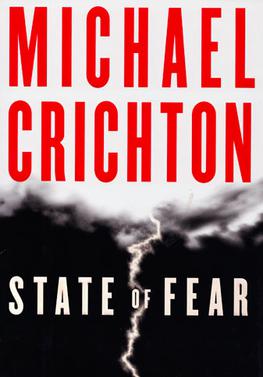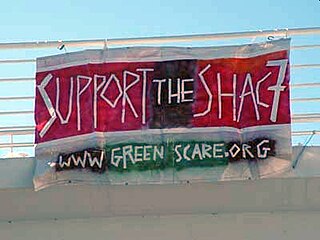Related Research Articles

The organized environmental movement is represented by a wide range of non-governmental organizations or NGOs that seek to address environmental issues in the United States. They operate on local, national, and international scales. Environmental NGOs vary widely in political views and in the ways they seek to influence the environmental policy of the United States and other governments.

A Friend of the Earth is a 2000 novel by T. Coraghessan Boyle. The novel is a story of environmental destruction set in 2025; as a result of global warming and the greenhouse effect, the climate has drastically changed, and, accordingly, biodiversity is a thing of the past.
Radical environmentalism is a grass-roots branch of the larger environmental movement that emerged from an ecocentrism-based frustration with the co-option of mainstream environmentalism.
Green anarchism, also known as ecological anarchism or eco-anarchism, is an anarchist school of thought that focuses on ecology and environmental issues. It is an anti-capitalist and anti-authoritarian form of radical environmentalism, which emphasises social organization, freedom and self-fulfillment.

Ecodefense: A Field Guide to Monkeywrenching is a book edited by Dave Foreman, with a foreword by Edward Abbey.
Eco-terrorism is an act of violence which is committed in support of environmental causes, against people or property.
Ecotage is sabotage carried out for environmental reasons.

Edward Paul Abbey was an American author and essayist noted for his advocacy of environmental issues, criticism of public land policies, and anarchist political views. His best-known works include the novel The Monkey Wrench Gang, which has been cited as an inspiration by radical environmental groups, and the non-fiction work Desert Solitaire.

The Monkey Wrench Gang is a novel written by American author Edward Abbey (1927–1989), published in 1975.
William David Foreman was an American advocate for the conservation of wild lands and wildlife. He was a co-founder of three organizations: Earth First!, the Wildlands Project, and the Rewilding Institute. A prominent member of the radical environmentalism movement beginning in the 1980s, his advocacy and actions shifted in the early 1990s into collaborations with professionals in the field of conservation biology.
George Washington Hayduke is a fictional character in Edward Abbey's novels The Monkey Wrench Gang and Hayduke Lives! Hayduke is portrayed as a rugged individualist in the books by Abbey, and has a predilection for working independently when protecting the environment. He is at first skeptical of working with the rest of the monkey wrench gang early in the first book, but soon collaborates with them.

State of Fear is a 2004 techno-thriller novel by Michael Crichton, his fourteenth under his own name and twenty-fourth overall, in which eco-terrorists plot mass murder to publicize the danger of global warming. Despite being a work of fiction, the book contains many graphs and footnotes, two appendices, and a 20-page bibliography in support of Crichton's beliefs about global warming. Climate scientists, science journalists, environmental groups, and science advocacy organizations have disputed the views presented in the book.
Ecotage! was a 1972 paperback book edited by Sam Love and David Obst and published by Pocket Books.

Environmentalism or environmental rights is a broad philosophy, ideology, and social movement about supporting life, habitats, and surroundings. While environmentalism focuses more on the environmental and nature-related aspects of green ideology and politics, ecologism combines the ideology of social ecology and environmentalism. Ecologism is more commonly used in continental European languages, while environmentalism is more commonly used in English but the words have slightly different connotations.
Leaderless resistance, or phantom cell structure, is a social resistance strategy in which small, independent groups, or individuals, challenge an established institution such as a law, economic system, social order, or government. Leaderless resistance can encompass anything from non-violent protest and civil disobedience to vandalism, terrorism, and other violent activity.
Ecofascism is a term used to describe individuals and groups which combine environmentalism with fascism.

The Green Scare is legal action by the US government against the radical environmental movement, that occurred mostly in the 2000s. It alludes to the Red Scares, periods of fear over communist infiltration of US society.
The Earth Liberation Front (ELF), also known as "Elves" or "The Elves", is the collective name for autonomous individuals or covert cells who, according to the ELF Press Office, use "economic sabotage and guerrilla warfare to stop the exploitation and destruction of the environment".
Bron Raymond Taylor is an American scholar and conservationist. He is professor of religion and nature at the University of Florida and has also been an affiliated scholar with the Center for Environment and Development at the University of Oslo. Taylor works principally in the areas of religion and ecology, environmental ethics and environmental philosophy. He is also a prominent historian and ethnographer of environmentalism and especially radical environmentalist movements, surfing culture and nature-based spiritualities. Taylor is also editor-in-chief of the Encyclopedia of Religion and Nature and subsequently founded the International Society for the Study of Religion, Nature and Culture, serving as its president from 2006 to 2009. He also founded the society's affiliated Journal for the Study of Religion, Nature and Culture, serving as its editor since 2007.
Ecofiction is the branch of literature that encompasses nature or environment-oriented works of fiction. While this super genre's roots are seen in classic, pastoral, magical realism, animal metamorphoses, science fiction, and other genres, the term ecofiction did not become popular until the 1960s when various movements created the platform for an explosion of environmental and nature literature, which also inspired ecocriticism. Ecocriticism is the study of literature and the environment from an interdisciplinary point of view, where literature scholars analyze texts that illustrate environmental concerns and examine the various ways literature treats the subject of nature. Environmentalists have claimed that the human relationship with the ecosystem often went unremarked in earlier literature.
References
- ↑ Darlington, Joseph (2018). "Chapter 6 Environmentalists and Conservationists: Terrorising the Countryside". British Terrorist Novels of the 1970s. Springer. pp. 123–124. ISBN 978-3-319-77896-9.
- ↑ Ziser, Michael (2011). "Terrists: Ecosabotage, the Militia Movement, and The Monkey Wrench Gang". Terrorism and Narrative Practice. LIT Verlag Münster. pp. 201–218. ISBN 978-3-643-80082-4.
- 1 2 Buell, Lawrence (2009). "What is Called Ecoterrorism" (PDF). Gramma: A Journal of Theory and Criticism: 155. ISSN 1106-1170.
- ↑ Murray, Robin L.; Heumann, Joseph K. (2009-01-08). "Chapter 7 Eco-Terrorism in Film: Pale Rider and the Revenge Cycle". Ecology and Popular Film: Cinema on the Edge. SUNY Press. ISBN 978-0-7914-7678-9.
- ↑ Stableford, Brian (2006). "Ecocatastrophe". Science Fact and Science Fiction: An Encyclopedia . Taylor & Francis. p. 140. ISBN 978-0-415-97460-8.
- ↑ Philippon, Daniel J. (2000). "Eco-Terrorism". In Pendergast, Tom; Pendergast, Sara (eds.). St. James Encyclopedia of Popular Culture Volume 2: E–J. Detroit: St. James Press. pp. 10–11. ISBN 1-55862-402-3.
- ↑ "Climate Change Fiction Is Rethinking The Ecoterrorist". BuzzFeed News. Retrieved 2021-06-11.